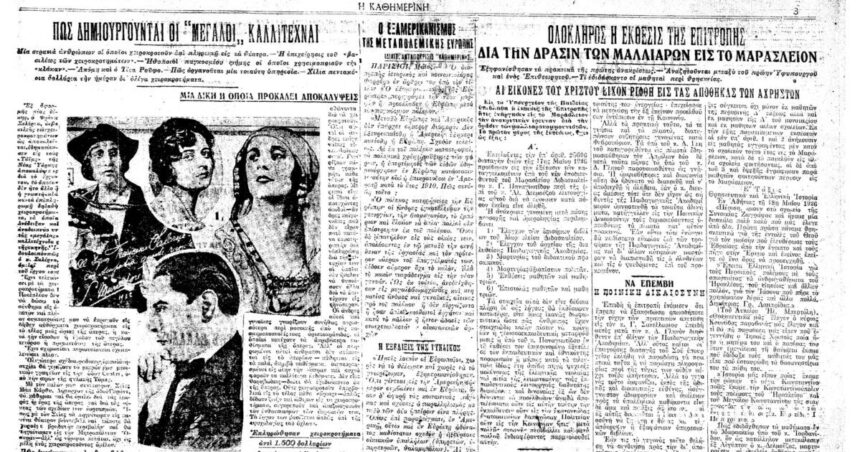We are in 1925: Greece is trying to get back on its feet after the Asia Minor Disaster and the arrival of refugees, while it has gone through great changes with the departure of George II and the establishment of the despotic republic. Since June, general Theodoros Pangalos has seized power in the country with a military movement, targeting, among others, the communists.
The situation in the cultural development was complicated by the so-called language issue, i.e. the controversy regarding the preservation of the katharevousa or the adoption of the native (which preoccupied the Greeks since the foundation of the modern Greek state), despite the fact that in 1911 it had been established in the Constitution as official language of the state, the clear language. The “hairmakers”, as the supporters of the municipality were called, were often accused of being communists or having anti-national activities. A typical example of this phenomenon were the events that came to be known as the “Marasley events”.
Around 1925, the then young Roza Imbrioti had just completed her studies in Berlin and Paris and returned to Greece to look for work. Alexandros Delmouzos, then director of Marasliou Pedagogical Teaching, invited Imbrioti to teach the History course there. Delmouzos, together with Dimitrios Glinos and Manolis Triantafyllidis, were key representatives of the educational reform attempted by Eleftherios Venizelos from 1917, which focused on liberal pedagogical methods and supported the use and teaching of elementary school. In 1914, he was involved in the “Atheics of Volos” when, as the director of the Volos High School for Girls, he was put on trial on charges of atheism, anti-nationalism and spreading socialist ideas (of which he was eventually acquitted). Thus, Roza Imbrioti entered a school environment that was extremely innovative and liberal for the time.
However, in March 1925, a meeting of the professors of Maraslei was to lead the populists of the time to new adventures. At that meeting, three professors named Dimitrakopoulos, Gennimatas and Karmas, disagreed with Imbrioti regarding the method of teaching History, accusing her of “materialistic” (communist, that is) teaching of the Revolution of 1821. Imbrioti taught that the Revolution of ’21 “is thought and execution and the result of the rebellion of the Urban class, influenced by the rebellion of similar classes in the West”, a fact which the three professors considered to be a falsification of History. Although Alexandros Delmouzos removed them from the Marasleio, they filed complaints leading the Ministry of Education and the Holy Synod to investigate, as the school administration was now accused of anti-national teaching, abolition of the Religious Studies course and morning prayer.
“Kathimerini”, presenting the report of the commission of inquiry “on the action of the hairdressers in Maraslion”, wrote in the paper of May 30, 1926: “It is well-known that the noise raised in the journalism for a year that the management of Mr. Delmouzou the teaching of religious subjects had been removed from the four classes of the multi-grade Primary School of Maraslei. The causes of the outcry against Maraslei were the three well-known public teachers of Maraslei […]. Their apology was so enlightening and demonstrated the truth of their confession so clearly and with irrefutable evidence that there is no doubt about it today, because they proved not only that the holy things are not taught, but that the violent wind the You buried in the Maraslion, after the icons of the heroes of the Revolution and the icons of Christ, which had adorned all the halls of tradition since the founding of the institution, were discarded into useless storage.
In fact, in order to investigate the issue, the committee of the Ministry of Education also examined the reports of school students on the topic “What were you taught last year in History and Religion”, some of which he quoted verbatim in the same report: “”We did not do religious because the teacher didn’t believe that there was no church and that’s why he didn’t tell us stories. He never told us history; sometimes he was bored, sometimes he would say that his head hurt and he would pretend to be Mrs. Maria Eldestay and he would also read us fairy tales. – Achilleus N. Anastasiou”. […] “Once, Mr. Iordanidis gave us a synedriasis, but he never said a word to us about anything that didn’t concern him. After all, you couldn’t see an image anywhere because Mr. Iordanidis didn’t allow it… – Elev. Gavalas””.
But, as it seems, things were not that simple, as the report that the Areopagite George Antonakakis undertook to compile proved the opposite of that of the Pangalian Ministry of Education. “The phrases and meanings of these answers [σ.σ. στις εκθέσεις των μαθητών] it is quite evident that they do not immediately belong to the children, but have been received from instruction, which was given to them. They do not answer the question “what did they do religiously in the 4th class” which the committee says they were told, but to the question, if Mr. Iordanidis did them religiously, it does not appear.
As it was realized, the story of the “Marasleians” was based on falsified or completely false data and it was necessary to gather a lot of evidence, even comparing graphic characters, questioning students, teachers, relatives and servants to refute the findings of the committee of the Ministry of Education , which had also spoken of love affairs between the students who “served despite the management working in communist-style debauchery, smoothing the entrance to the Bolshevik paradise”. A typical example of the accusations of immorality was the – ultimately false – story that a schoolgirl once urinated on the sidewalk in front of her uncle, “because that’s what the Maraslio taught them.”
In his final conclusion, Georgios Antonakakis wrote: “The whole issue of the “Maraslians” belongs to the series of the well-known dispute between the two linguistic ideologies; the vernacular, which had been introduced and used in the Maraslian Teaching and the Pedagogical Academy, was the stone of scandal. All the others, anti-religiousness, anti-nationalism and immorality, were means of attack, legitimately considered, against the main enemy, the municipality, and were used because it was known that these would mainly make an impression, that through them the Greek society would be mobilized, as it was mobilized. whole”. And he concluded: “Mr. Al. I do not know Delmouzon personally. […] But I know him from his previous work, as faithfully depicted in the case file. And this project was a lot of hard work and enormous experimentation, to create a better school of tomorrow for the children of Greece. It was a work full of pulsating religious feeling, of lively optimistic patriotic enthusiasm, a work which, even though he had reservations about the use of an extremely vernacular language, deserved better luck. He won all my respect.”
However, from November 28, 1925 until the beginning of 1926, Alexandros Delmouzos, Dimitrios Glinos and Roza Imbrioti were dismissed from Marasleio – the first for “economic reasons” and the third because of the accusations against her. In 1928, Delmouzos was elected Professor of Pedagogy at the Aristotle University of Thessaloniki, a position he resigned with the establishment of the Metaxas dictatorship. Rosa Imbrioti visited Germany and France for her further education in the period 1927-1930. In 1934 she became a high school principal in Kilkis, becoming the first woman to hold this position in the history of Greek education. During the dictatorship of Metaxas, she was suspended for her socialist ideas, but in February 1936 she founded, with the support of Metaxas, the first “School for Abnormal and Retarded Children”, which was renamed two years later to the “Model Special School of Athens” » in Kaisariani.
Column Editor: Myrto Katsigera, Vassilis Minakakis, Antigoni-Despina Poimenidou, Athanasios Syroplakis




